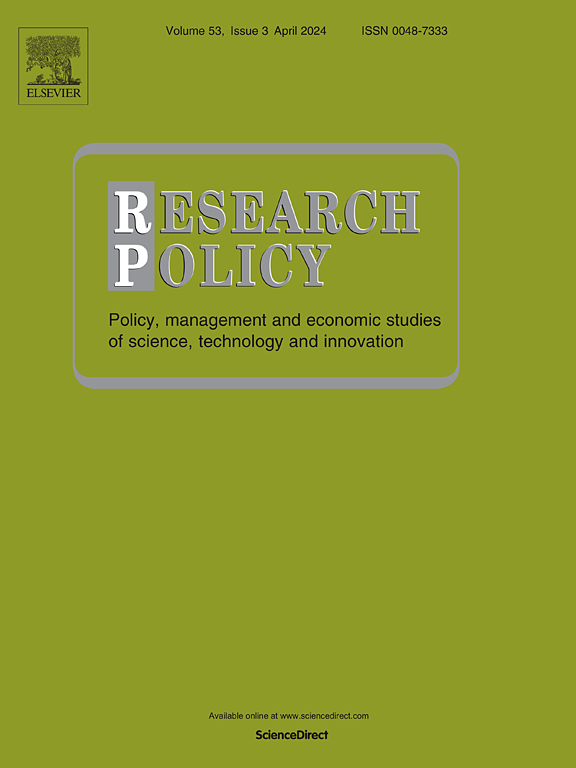农业研究机构的影响文化:做什么,怎么做?
IF 7.5
1区 管理学
Q1 MANAGEMENT
引用次数: 0
摘要
研究机构越来越需要对其活动的多维社会影响进行分析。这促使人们更多地思考如何整合组织战略,致力于研究评估和影响监测,以满足社会和资助者的需求,改进研究实践,使研究和创新对社会更具变革性。在组织内部建立 "影响力文化 "受到多种因素的驱动,并在不同的组织层面转化为各种变革。我们旨在了解农业研究机构发展影响力文化的动机,以及这种文化对研究、管理和合作实践的影响。为此,我们分析了三个研究机构的组织轨迹:法国国际发展农业研究中心(Cirad)、巴西农业研究公司(Embrapa)和哥伦比亚农业研究公司(AGROSAVIA)。通过对这些案例进行交叉分析,从将影响评估纳入战略议程的原因、影响文化在实践中的具体化,以及影响文化在各自员工和管理结构中的认知和实践变化等方面,我们强调了影响文化发展的驱动力和模式,以及似乎有利于或阻碍其出现的环境。这项研究的独特之处在于,它特别考察了影响力文化能够在个人中产生的各种变化。它提供了宝贵的材料,有助于根据组织的价值观、优先事项和机遇,重新探究和定位研究组织的影响力文化之路。本文章由计算机程序翻译,如有差异,请以英文原文为准。
Culture of impact in agricultural research organisations: What for and how?
Research organisations experience increasing demands to analyse on the multidimensional societal impacts of their activities. This leads to more reflections about the integration of organisational strategies devoted to research evaluation and impact monitoring, in order to answer societal and funder's demands, improve research practices, and make research and innovations more transformative to society. Establishing a “culture of impact” within an organisation is driven by multiple factors and translates into a variety of changes at different organisational levels. We aim to understand what motivates agricultural research organisations to develop a culture of impact, and the consequences of this culture on research, management, and collaboration practices. For this, we analyse organisational trajectories of three research organisations: the French Agricultural Research Centre for International Development (Cirad), the Brazilian Agricultural Research Corporation (Embrapa), and the Colombian Agricultural Research Corporation (AGROSAVIA). Through a cross-analysis of these cases along the reasons to integrate impact evaluation in strategic agendas, the materialisation of a culture of impact in practice, and what it entails in terms of cognitive and practical changes within their respective staff and management structures, we highlight drivers and patterns of development of a culture of impact, and circumstances that seem to either favour or hinder its emergence. This study is unique for examining various types of changes that a culture of impact can generate among individuals, in particular. It offers valuable material to enable re-interrogate and orient a research organisation's culture of impact's path in accordance with organisational values, priorities, and opportunities.
求助全文
通过发布文献求助,成功后即可免费获取论文全文。
去求助
来源期刊

Research Policy
MANAGEMENT-
CiteScore
12.80
自引率
6.90%
发文量
182
期刊介绍:
Research Policy (RP) articles explore the interaction between innovation, technology, or research, and economic, social, political, and organizational processes, both empirically and theoretically. All RP papers are expected to provide insights with implications for policy or management.
Research Policy (RP) is a multidisciplinary journal focused on analyzing, understanding, and effectively addressing the challenges posed by innovation, technology, R&D, and science. This includes activities related to knowledge creation, diffusion, acquisition, and exploitation in the form of new or improved products, processes, or services, across economic, policy, management, organizational, and environmental dimensions.
 求助内容:
求助内容: 应助结果提醒方式:
应助结果提醒方式:


